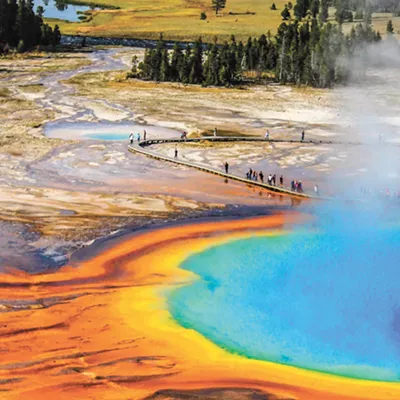Like many business owners, Paul Gisselberg did plenty of homework before venturing out on his own. A branch manager for Loomis Armored Car Service, Gisselberg knew about the parcel business. So when he heard that City Parcel, one of Spokane's oldest firms, was about to go out of business, he decided to quit his job and bring the company back to life. But all the packaging and delivery know-how in the world couldn't have prepared Gisselberg for what has turned out to be a quarter-century struggle with the Department of Ecology. The trouble began when City Parcel moved into a warehouse at 708 N. Cook Sreet to accommodate its growth.
"I was purchasing [the property], and we hadn't closed yet," Gisselberg says, recalling his first inkling that something could be wrong with the lot. "I heard something on my radio as I was driving in my car that caught my attention. Basically, it was a message that PCBs are harmful."
PCBs, or polychlorinated biphenyls, are manufactured synthetic chemicals, both solid and liquid, that were used until 1977 as insulating fluids, coolants and lubricants in transformers, capacitors and electrical equipment, as well as in other industries. Gisselberg, knowing the lot he was buying had previously been a transformer repair and recycling operation, called Spokane Transformer. He says he checked with the owners to find out if PCBs were used there, but didn't look into the matter further.
What Gisselberg didn't know was that Ecology had begun investigating the site in 1976 -- five years before he bought it. Ecology says PCBs were present in the soil and groundwater when the previous owners sold him the lot.
"[Ecology] never made it known to me," Gisselberg says. He claims Ecology came to him later, when they wanted him to clean it up. At first, he cooperated. Gisselberg hired an engineer to test levels of PCB contamination.
"We spent a lot of money and drilled a well to see if there were PCBs. We made all that information known to [Ecology], and it just went on and on," Gisselberg says. Decades passed. After Ecology requested further studies at more cost, Gisselberg stopped complying. Ecology took over, initiating comprehensive tests; in 1998 Ecology determined that on a scale of one to five -- one being the most serious risk to human health -- the site was judged a two.
"There's no evidence anyone has gotten sick," says Jani Gilbert, spokeswoman for Ecology. "But the key is to prevent that. This is an industrial area surrounded by residential neighborhoods."
Still, it took Ecology more than 20 years to determine the level of PCB contamination on the site. "We have lots of other cleanup sites on our list," explains Gilbert. "We had other sites that took priority; it's a matter of moving down the list."
When Ecology was ready to clean up, nobody wanted to pay, so lawyers were hired. Gisselberg sued the former owners of Spokane Transformer, Richard Boyce and Jerry Overton.
"In 1999, there were conclusions that assigned liability for the contamination," says Teresita Bala, an environmental engineer with Ecology. "[Gisselberg] was assigned liability of 25 percent and the two former owners [were each assigned] 37.5 percent."
But the ruling may as well never have happened, since no one is abiding by it. "I disagree with the finding vehemently," Gisselberg says. "The thing that bothers me about this is that I ended up being the owner, but I didn't contaminate [the lot]. If I was the guilty party, there never would have been a peep out of me; I would have cleaned it up."
Gisselberg, who now leases City Parcel, is retired and lives in Western Washington. He claims he's spent close to $150,000 on the environmental engineering and attorneys' fees. Boyd, one of the previous owners, lives on the West Side as well, and Overton has an Arizona address. They could not be reached for comment. Now Ecology is considering tearing the building down and cleaning out the site with taxpayer dollars.
"It could cost anywhere between $200,000 to $5 million," says Bala. As it is, Bala estimates that Ecology has already spent about $300,000 of taxpayer money on the site.
"After we've selected the cleanup remedy, we'll try to negotiate with the potentially liable partners," Bala says. "We can take them to court, or the state can just pay." Bala adds that Ecology will decide by this summer -- 28 years after PCBs were initially detected.
Gisselberg says he's spent enough money already, and the previous owners, who have so far successfully stonewalled Ecology, should be forced to pay.
"I belong to environmental groups; you're not talking to someone who is anti-environmental," Gisselberg says. "But I'm not losing sleep over it -- there's no point. I'm 74 and into retirement, and life is so short. Whatever happens, happens. But the state sure isn't going to roll over me."
Publication date: 04/29/04















